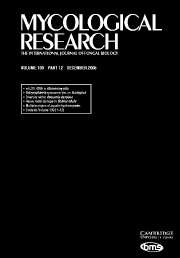Article contents
Effects of inhibitors of sclerotium formation on the sclerotial mycoparasite Coniothyrium minitans and its host Sclerotinia sclerotiorum
Published online by Cambridge University Press: 17 January 2001
Abstract
The formation of sclerotia is inhibited by certain chemicals. These resting fungal structures are also parasitized by mycoparasites. This study reports results of experiments on the effect of four sclerotial inhibitors on the sclerotial mycoparasite Coniothyrium minitans and was carried out in an attempt to determine possible compatibilities between sclerotial inhibitors and mycoparasites. Thioglycolic acid was the most toxic to mycelial growth while its sodium salt was totally non-toxic. Mercaptoethanol and mercaptoethylamine were intermediate. At low concentrations, pycnidial formation by C. minitans was not hindered by any of the compounds tested. All four compounds inhibited the formation of sclerotia in Sclerotinia sclerotiorum. Sclerotia are also parasitized by C. minitans. Na-thioglycolate should be tested further as it had no adverse effect on the mycelial growth and pycnidium formation in C. minitans, while it inhibited extensively the formation of sclerotia in S. sclerotiorum. These data suggest that Na-thioglycolate and C. minitans should be considered for use in integrated control.
- Type
- Research Article
- Information
- Copyright
- © The British Mycological Society 2000
- 4
- Cited by




